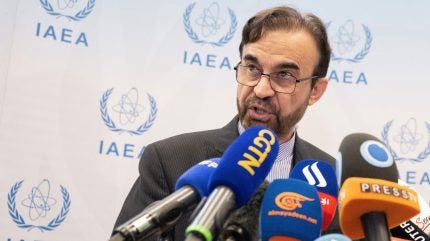
Iranian Foreign Minister Abbas Araqchi said in a post on his X account that the US and European troika – Britain, France and Germany (E3) – had “killed” the Cairo agreement with the International Atomic Energy Agency (IAEA). He said the US and E3 “have assaulted diplomacy every step of the way and brought about the collapse of the Cairo Agreement”.
Following the Israeli and US military strikes on its nuclear facilities in June, the Iranian Parliament unanimously passed legislation requiring the administration to suspend all cooperation with the IAEA, which it deemed complicit in the attacks, which it has never condemned. However, in September, Araqchi and IAEA Director General Rafael Grossi reached an agreement on practical modalities to resume cooperation after a meeting in Cairo.
Araqchi said Iran now considers the Cairo understanding with the IAEA terminated, following the passage of an anti-Iran resolution at the agency’s Board of Governors meeting.
Download sample pages of selected reports
Explore a selection of report samples we have handpicked for you. Get a preview of the insights inside. Download your free copy today.
His post came after the 35-nation Western-dominated board narrowly approved a resolution, urging Iran to “without delay” report on its enriched uranium stockpile and facilities damaged in the June military strikes by Israel and the US. The resolution, drafted by the E3 and the US, passed with 19 votes in favour, three against (Russia, China and Niger) and 12 abstentions and one non-vote.
The resolution requested information on “the verification of Iran’s uranium stockpile, including the locations, quantities, chemical forms, and enrichment levels, and the inventories of centrifuges and related equipment”. It urged Iran “to comply fully and without delay with its legal obligations” and “to extend full and prompt cooperation to the IAEA, including by providing such information and access that the Agency requests to this effect”.
It said Iran “must comply fully and without qualification with its NPT [Nuclear Non-Proliferation Treaty] Safeguards Agreement, including “with precise information on nuclear material accountancy and safeguarded nuclear facilities in Iran, and grant the Agency all access it requires to verify this information”. It called on Iran “to act strictly in accordance with the provisions of the Additional Protocol that it signed on 18 December 2003, and to fully implement this measure without delay”. It also re-established the Iran issue on the agenda of the regular board meetings.
The Additional Protocol grants more powers and oversight to the IAEA, especially by enabling it to conduct snap inspections at undeclared nuclear sites. While Iran signed the protocol in 2003, it never ratified it and suspended its implementation in 2021 in response to the US unilateral withdrawal from the 2015 Joint Comprehensive Plan of Action (JCPOA), which was the legal basis for IAEA oversight of Iran’s nuclear programme and lifted economic sanctions in exchange for restrictions on Iran’s nuclear programme.
Iran’s Foreign Ministry issued a statement saying it considers the resolution adopted by the Board of Governors “passed under pressure from the US, Germany, France, and the UK as illegal and unjustified”. It said the resolution “violates the fundamental principles of the Non‑Proliferation Treaty (NPT), which guarantees the inalienable right of member states to use nuclear energy for peaceful purposes”.
Legally, the Board of Governors has no authority to revive terminated Security Council resolutions, the statement noted, referring to the fact that those resolutions ceased to have any validity with the expiration in October of the JCPOA. “The attempt by the three European countries and the US to suggest such authority exists is a clear sign of bad faith and irresponsible behaviour toward the agency’s procedures and regulations,” the statement said.
“In principle, the US, as the party that over the past decade has been the main instigator of crises over Iran’s nuclear issue, having unilaterally and illegally withdrawn from the JCPOA in 2018, and committed acts of military aggression against Iran including attacks on safeguarded nuclear facilities, is considered as the primary culprit for the current situation.” Germany, France, and the UK, due to their continuous violations of JCPOA commitments, especially since May 2018, and their subsequent alignment with the US and Israel in attacking Iranian nuclear facilities in June 2025 “must themselves be held accountable for the highly damaging consequences of their actions”.
By disregarding Iran’s responsible and good‑faith conduct, the three European countries and the US disrupted the positive trajectory established between Iran and the agency, forcing Iran to announce the termination of the Cairo accord, it said.
The statement reaffirmed Iran’s principled position in rejecting nuclear weapons and other weapons of mass destruction, noting that Israel “is the sole possessor of weapons of mass destruction in the region and the only obstacle to the establishment of a Middle East free of such weapons”.
It concluded: “It is a basic legal and logical principle that membership in any treaty, including the NPT, and acceptance of its stipulated obligations, must be accompanied by enjoyment of the rights and benefits provided therein. The Foreign Ministry… emphasises that it will spare no effort to safeguard the rights and interests of the Iranian nation in the field of peaceful nuclear energy.”
Foreign Ministry spokesman Esmaeil Baghaei said Iran is considering more countermeasures in response to the IAEA resolution. “In an official letter to the Agency, we declared that the so‑called Cairo agreement, which had been reached with Iran’s goodwill and after relatively long negotiations with the agency, is now cancelled. Other measures are also under consideration.”
He added that the IAEA’s “wholly irresponsible and unjustified” measure disregards the agency’s own standards and reduces the body to a mere political instrument for exerting pressure on certain member states. He noted that the resolution makes no reference whatsoever to the underlying reasons or causes of the present circumstances. “Neither in the resolution nor in the statements of the three European countries and the US is there the slightest reference to the fact that Israel and the United States attacked Iran’s nuclear facilities in June … [which led to] the cessation of the agency’s inspections and Iran’s cooperation.”
Following adoption of the resolution, Iran’s Ambassador to the IAEA, Reza Najafi, told reporters that it was designed to “exert undue pressure on Iran” and propagate a “false and misleading narrative of the present situation”. He described the authors of the resolution as “deaf and visionless” and said that they maintain “an arrogant and self-assured posture” by presuming that Iran is “obliged to continue its routine cooperation with the agency even under bombardment”.
Najafi said that Iran considers the current situation “far from normal” given that safeguarded facilities in Iran that contain “dangerous nuclear material” have been attacked. He said that Iran is “fully prepared for meaningful and constructive engagement” but at present, “the authors of resolutions have chosen a different course, under the mistaken belief that the pressure and threat will yield results”.
In his opening address to the Board of Governors, Gross referred to the Cairo Agreement. He also referred to the military strikes on Iran but without condemning them. “On 9 September 2025, I signed an agreement with Foreign Minister Araghchi in Cairo that provides an understanding of the procedures for Agency inspections, notifications and safeguards implementation in Iran, in the aftermath of the military attacks in June. Since then, Iran has facilitated access to the Agency for inspections and design information verification, with advanced notice, at almost all the unaffected facilities in Tehran. This is welcome.”
He added: “The Agency has yet to receive from Iran a report for the affected facilities and associated nuclear material which, in line with its obligations under the safeguards agreement, needs to be provided without delay. To date, the Agency has not conducted verification activities at any of the nuclear facilities in Iran affected by the military attacks. Though I note Iran’s cooperation on inspections at a number of facilities, further constructive engagement is needed. I urge Iran to facilitate the full and effective implementation of safeguards activities in Iran in accordance with its NPT Safeguards Agreement and I reiterate my disposition to work with Iran on this matter.”
Anticipating the resolution, he noted: “As I have already said, the establishment of the current status of Iran’s inventories of LEU and HEU needs to be addressed urgently. The Agency’s 5-month-long lack of access to this nuclear material in Iran means the material’s verification – according to standard safeguards practice – is long overdue. It is critical the Agency be able to verify this material as soon as possible.”
Belarus, China, Cuba, Iran, Nicaragua, Russia, Venezuela and Zimbabwe issued a joint statement after the approval of the anti-Iranian resolution by the Board. It noted that the resolution said nothing about the June military strikes on facilities that had been continuously inspected by the IAEA inspectors and that Grossi had failed to condemn them.
Russia’s permanent representative to international organisations in Vienna, Mikhail Ulyanov, said Western countries had deliberately “killed diplomacy” with Iran by pushing the resolution through. He said such resolutions are never adopted when genuine diplomacy is at work. “What we are seeing is very far from real politics.” He added that Moscow would first assess the situation before proposing any initiative.
In an interview reported by Tasnim, Iranian Foreign Minister Araqchi unequivocally rejected the attempts to push Iran toward ending its enrichment activities. “We will in no way accept zero enrichment, because this matter has become a source of national honour and pride,” he said. “We have paid heavy material and moral price for it (uranium enrichment), and we have sacrificed numerous nuclear martyrs to preserve it. We consider any agreement aimed at reducing the enrichment level to zero a betrayal, and we will not submit to it.”
On Iran’s cooperation with the IAEA, Araqchi added that Tehran’s engagement would be strictly limited to facilities that have not been targeted in the attacks in June. “In our interaction with the Agency, we have nothing to do with the bombed nuclear facilities and will cooperate only regarding those facilities that have not been bombed, and solely within the Agency’s regulations.”
Unlock up to 35% savings on GlobalData reports
Use the code at checkout in the report store
-
20% OFF
Buy 2 reports
Use code:
Bundle20
-
25% OFF
Buy 3 reports
Use code:
Bundle25
-
30% OFF
Buy 4 reports
Use code:
Bundle30
-
35% OFF
Buy 5+ reports
Use code:
Bundle35
Valid on all reports priced $995 and above. Cannot be combined with other offers.
Still deciding what will work best for your business?
Ask our experts for help.
Enquire before buying



